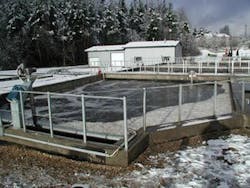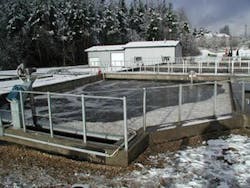Baltic Sea projects awarded at Stockholm Water Symposium
The 2002 Swedish Baltic Sea Water Award will be presented to the Lithuanian Housing and Urban Development Foundation (HUDF) Managing Director Aloyzas Vitkauskas on August 15 for the public organisation's innovative approach to reducing water pollution loads in the Baltic Sea and in Lithuania. HUDF programs and projects reduced Lithuania's organic pollution to the Baltic Sea from approximately 1,500 tons to 100 tons per year within the actual projects.
According to the Stockholm International Water Institute (SIWI), HUDF actively contributed to developing and coordinating local municipal competence, while helping to facilitate financing of the water and wastewater treatment works' establishment and operations. This strategy resulted in reduced eutrophication in water courses and coastal areas, particularly within the Nemunas River basin, which drains more than 75% of the country. In addition, HUDF efforts helped Lithuania comply with European Union urban wastewater treatment standards.
Specifically, the foundation implemented projects to improve the environment, enhance energy efficiency, water supply and wastewater treatment, and solid waste management. It implemented 20 municipal environmental infrastructure projects, focusing on wastewater discharges and clean water issues. The foundation's overall approach should serve as a model for other regions in the Baltic Sea to reduce pollution loads, according to SIWI.
In 2005, one of the region's worst "hot spots" of pollution is expected to reduce its untreated sewage discharges by approximately 330,000 m3 per day to the Baltic Sea - 15% of its total daily contribution. Last May 21, an international consortium signed a US$ 120-million turnkey contract to design, construct and operate an activated sludge plant, with a capacity of 700,000 pe for the city of St. Petersburg. Half of the city's wastewater is discharged without any treatment. The Russian city is one of 132 sources of contamination identified by the Helsinki Commission for Baltic Sea (HELCOM) around the sea.
Wastewater that passes through the treatment plant will be treated in three stages - mechanical, biological and chemical - producing treated effluent that meets requirements established by the European Union and Helcom.
Skanska East Europe Oy, NCC International AB and SWTP Construction Oy, a construction company founded by YIT Construction Ltd, form the consortium that signed the construction contract with Nordvod, the Russian ownership company. Skanska owns a 14% interest in Nordvod.
The Southwest Wastewater Treatment Plant will be constructed in accordance with a public private-partnership model, with the municipality of St. Petersburg and private companies working together in terms of financing and ownership. Vodokanal, the water company in St. Petersburg, owns 40% of Nordvod, with other owners consisting of Nordic-Environment Finance Corporation, NEFCO (20%) and the consortium of Skanska, NCC and YIT, which holds a combined ownership of 40%.
The wastewater treatment plant is the first project to be implemented under the framework of Northern Dimension Environmental Partnership (NDEP), an international environment program initiated by the European Union Commission, countries around the Baltic Sea and international financial institutes.
Nine Baltic Sea nations launched the "Baltic Sea Regional Project," a six-year US$ 40-million project to improve the marine environment, promote sustain-able use of the area, and to maximise economic benefits for coastal communities. The Global Environment Facility (GEF) accepted the project last March and contributed US$ 18 million; however the total budget for the project will be US$ 40 million.
The project is built on the Large Marine Ecosystem (LME) concept, which means that since pollution and marine life do not respect state boundaries, management should also be at a higher regional level, according to the International Council for the Explora-tion of the Sea (ICES). One objective of the project is to develop ecosystem management tools to manage the whole Baltic Sea ecosystem. Management decisions will apply not only to the immediate recipients (Estonia, Latvia, Lithuania, Russia and Poland), but also to the states included in the catchment area. HELCOM will manage the project's land and coastal management activities, which aim to reduce non-point source pollution from agricultural enterprises.

